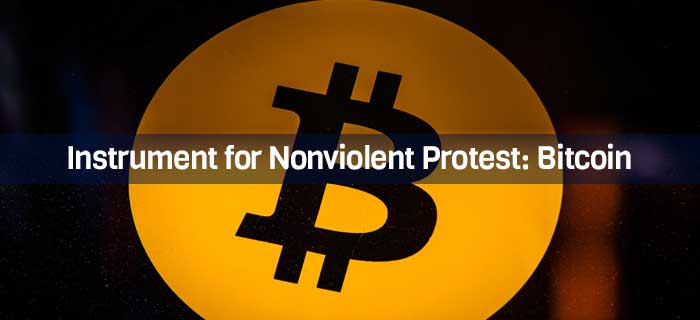Amidst the constantly shifting terrain of socio-political movements, the advent of the digital age has ushered in new avenues for individuals and communities to effectively voice their objections through nonviolent means.
This discourse endeavors to intricately examine the captivating capacities of Bitcoin as a vehicle for nonviolent dissent, delving into its inherent characteristics, far-reaching consequences, and pivotal contribution in molding the trajectory of activist endeavors to come. In the empire of online trading, platforms like Immediate Peak Site are becoming increasingly popular for those interested in diversifying their investment strategies, especially in the backdrop of Bitcoin’s role in nonviolent protests.
Understanding Bitcoin’s Distinctive Attributes
Decentralization and Autonomy
At the heart of Bitcoin’s appeal lies its decentralized nature. Unlike traditional currencies controlled by central authorities, Bitcoin operates on a peer-to-peer network that empowers users to send and receive funds without intermediaries. This decentralization gives rise to a sense of autonomy – a critical aspect of effective nonviolent protest.
Anonymity and Privacy
Bitcoin transactions are pseudonymous, meaning they are not directly tied to real-world identities. This characteristic offers protesters a level of privacy that can shield them from potential backlash. Activists can engage in financial transactions without fear of direct identification, making it harder for oppressive regimes to suppress dissent.
Accessibility and Inclusivity
Bitcoin transcends geographical boundaries, making it accessible to anyone with an internet connection. This inclusivity enhances its potential as a tool for nonviolent protest, allowing individuals from various socio-economic backgrounds to participate in movements without facing financial barriers.
Bitcoin’s Role in Nonviolent Protest
Economic Disobedience
Nonviolent protest often hinges on economic disobedience – disrupting systems by withdrawing support. Bitcoin, as a decentralized currency, provides a means for individuals to express their dissent by diverting funds away from institutions they oppose. This form of economic protest can have a significant impact on the targeted entities.
Evading Financial Censorship
In regions where financial censorship is a concern, Bitcoin offers an alternative. Governments or organizations attempting to stifle dissent may resort to freezing bank accounts or imposing transaction limits. Bitcoin’s decentralized nature makes such measures ineffective, allowing protesters to maintain control over their resources.
Fundraising for Activism
Raising funds is a critical aspect of sustaining any movement. Bitcoin’s borderless nature simplifies the process of collecting donations from supporters around the world. This global accessibility can accelerate the growth of grassroots movements that rely on community funding.
Challenges and Considerations
Volatility
Bitcoin’s inherent volatility, widely recognized, presents a considerable obstacle for activists seeking to ensure consistent financial stability for their endeavors. The abrupt and substantial price oscillations characteristic of Bitcoin could potentially undermine meticulously devised initiatives, underscoring the need for meticulous financial management and the implementation of effective hedging strategies to mitigate the disruptive impacts of these fluctuations.
Regulatory Concerns
On a global scale, governments are currently facing intricate challenges in formulating effective regulatory frameworks for cryptocurrencies. As activists progressively adopt Bitcoin as a means of protest, the intersection of regulatory measures and the aspiration for decentralized modes of expression is poised to engender conflicts and tensions. The growing utilization of Bitcoin in protest scenarios is likely to catalyze discussions about striking a balance between regulatory control and the preservation of unfettered, decentralized avenues for activism.
Technological Barriers
Although Bitcoin’s accessibility is a notable advantage, it is imperative to recognize that not all individuals possess the requisite technical proficiency needed to effectively navigate cryptocurrency transactions. Addressing and bridging this knowledge gap assumes critical importance to guarantee the inclusivity and broad participation of diverse individuals within the realm of nonviolent movements, preventing the potential exclusion of those who might be less familiar with the intricacies of cryptocurrency operations.
The Future of Nonviolent Protest with Bitcoin
The incorporation of Bitcoin into the arsenal of nonviolent protest represents a transformative shift in the landscape of social activism. The distinctive features of decentralization, anonymity, and accessibility inherent to Bitcoin bestow upon individuals and collectives the ability to articulate dissent in unprecedented manners. Nonetheless, the effective harnessing of Bitcoin as a tool for protest demands a sophisticated comprehension of its capacities, intricacies, and the overarching socio-political context within which it operates.
The Bottom Line
In summation, the emergence of Bitcoin as a promising tool for nonviolent protest signals the advent of a fresh epoch in the realm of activism. Its capacity to revolutionize economic resistance, circumvent financial censorship, and streamline fundraising stands as an unparalleled prospect.
Nevertheless, the hurdles posed by its volatility, regulatory ambiguities, and technological complexities necessitate careful consideration. As society continues to evolve and embrace digital advancements, the role of Bitcoin in shaping the trajectory of nonviolent protest persists as a captivating and imperative area of investigation.

Jamie Johnson is very enthusiastic Kansas City – based freelance writer, and her core expertise are finance and insurance. She has been endorsed on several personal finance, insurance & business website to share her thoughts. Her publications can be found on famous sites like Bankrate, The Balance, Business Insider, Chamber of Commerce and many others.
From many years, she served more than 10,000 hours of research and writing to more than 2000 articles related to personal finance, credit building, mortgages, and personal and student loans.







